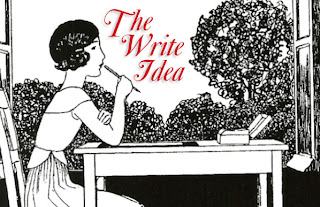
My ancestor was childless??
What the heck?
It's discouraging when a favorite ghost vanishes into thin air. But it's exhilarating to discover another waiting in the shadows. Some of them whisper and others tap me on the shoulder; they want to be remembered.
Alex Haley wrote, "There's an African tradition that says three kinds of people live in every family: those you can see, walking around; those who are waiting to be born; and those who have gone on to join the ancestors."
He continued, "I hadn't seen my old Cousin Georgia for many years. She was in her eighties, bedridden and ailing when I visited and mentioned my interest in the family stories I'd heard my Grandma Cynthia recite. From the time I was five years old, I'd crouched on the porch behind the rocking chair, while the various sisters, nieces, aunts and cousins of my grandmother's generation sat knitting, weaving back and forth through the centuries in their talk. I told Georgia I was researching those memories so I could write them down.
"As I left, she told me something that galvanized me—something that has driven and sustained me ever since: 'Boy, yo' sweet granma and all of 'em—dey up dere, watchin'. So you go do what you got to do.'
Alex Haley wrote, "There's an African tradition that says three kinds of people live in every family: those you can see, walking around; those who are waiting to be born; and those who have gone on to join the ancestors."
He continued, "I hadn't seen my old Cousin Georgia for many years. She was in her eighties, bedridden and ailing when I visited and mentioned my interest in the family stories I'd heard my Grandma Cynthia recite. From the time I was five years old, I'd crouched on the porch behind the rocking chair, while the various sisters, nieces, aunts and cousins of my grandmother's generation sat knitting, weaving back and forth through the centuries in their talk. I told Georgia I was researching those memories so I could write them down.
"As I left, she told me something that galvanized me—something that has driven and sustained me ever since: 'Boy, yo' sweet granma and all of 'em—dey up dere, watchin'. So you go do what you got to do.'

I'm doin' what I got to do. Six or seven hours every day I sit in front of my computer, obsessed with following every lead that might take me to something I need to know about medieval times. I'm foraging for cultural history and anecdotes to illuminate a life-style, looking for impressions that will make my dusty mothers and fathers sparkle with personality.
One reason Roots became a phenomenal bestseller was Alex Haley's ability as a storyteller. Beyond his research and writing abilities, he could sit back and talk—in the same spirit of oral-history tradition his ancestors possessed.
Telling about the fourteen years it took him to write the book he said, "There were very sparse genealogical records. People without records are robbed of their past. I had to start from scratch with census records on microfilm, looking for names that changed from generation to generation. The lists seemed endless, and my curiosity was rapidly diminishing. The thought that I'd ever run across a familiar name among so many countless thousands seemed hopeless and I got up to leave. It gives me the quivers to think how close I came to giving up.
"But as I was walking out, I passed through the genealogical-search room and I happened to notice that, unlike the reading rooms of most libraries, where people are sitting back relaxed and comfortable, everyone there was bent intently over old documents, some with magnifying glasses. And the thought came into my head: These people are all here trying to find out who they are. It matters. I turned around and went back to the microfilm room and picked up where I had left off.
"Some rolls later, as I was slowly turning the crank, I suddenly found myself looking down at the name Murray, Tom, Blacksmith, Black. I was staggered. I had stumbled upon incontrovertible evidence that I, my family, indeed, did have a past, a heritage. I just didn't know about it."

I had a moment like this several years ago in the British Museum Reading Room. There, in a copy of the Domesday Book (a survey of England compiled in 1086 for William the Conqueror) I read:
"Hamo (of Mascy) holds the Baggiley Hundred, paying 1 hide in tax. Land for 3 ploughs, 2 ploughman, 2 villages and woodland, 1 acre, a priest and a church and a mill. Value 3s. He is a free man. His son is called William de Baggiley."
I'm writing my book because I have a past, and I want to know about it. (Some of my ancestors must have had kids!)
*Homework
~Write down a family legend. Are you descended from a pirate, a princess, a pilgrim?
~Is there a time and place in history that fascinates you? Read a book about it.
~Are you losing interest in a goal? Remind yourself why you set it in the first place. Does it still matter to you? If not, cross it off your list. If so, write down a few smaller goals to get yourself back on track.








_-_The_Haymaker_(1869).jpg)































